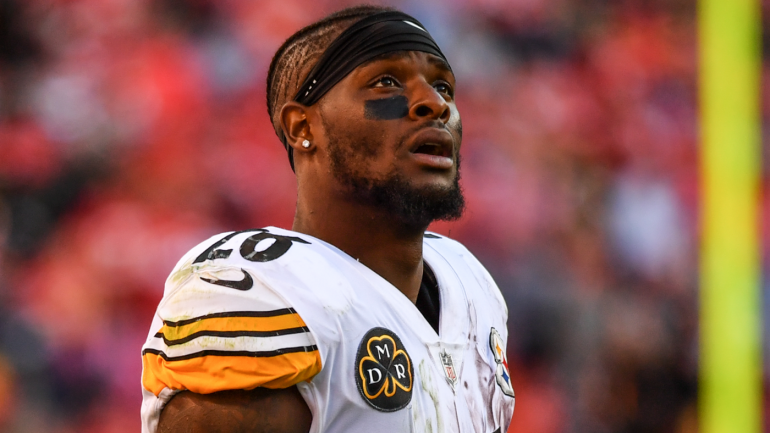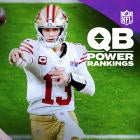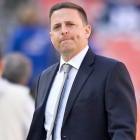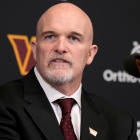
"Running backs are expendable."
Those words, recently spoken by my brother-in-law, stung me like a Clubber Lang punch to the stomach. I grew up in the 1990s, when the NFL's biggest names were mostly running backs. Emmitt Smith won league and Super Bowl MVP in the same year. Barry Sanders shared league MVP honors with Brett Favre the same year Terrell Davis carried the Broncos to an upset of Favre's Packers in Super Bowl XXXII. The following year, Davis won league MVP as Denver repeated as champion.
Odds are, if you had the No. 1 pick in your fantasy football league entering the '98 season, you were taking either Sanders or Davis, without much hesitation -- a pedestal for backs that hasn't changed that much in the fantasy world, but one they're far from atop these days in reality.
If the '90s were a high point for the running back position, the 2020s represent the low point. Only three running backs currently have multi-year deals that equal $50 million. Conversely, three quarterbacks will make north of $50 million this year, with that number set to go up as soon when Joe Burrow signs an extension. Many of of the league's best backs -- a list that includes Saquon Barkley, Jonathan Taylor, Josh Jacobs and Austin Ekeler -- are woefully underpaid. Ezekiel Elliott and Dalvin Cook, who amassed a combined 2,436 total yards and 22 touchdowns last season, are free agents.
Things have gotten so bad for the position that Ekeler recently hosted a virtual meeting with some of the league's top backs. The goal of the meeting was to try to figure out the best way to make it clear to team owners that top-notch running backs are still worth investing in.
"All the running backs out there, what we can do in the short term is to continue to make an impact," Ekeler said during a one-on-one interview with CBS Sports. "I'm going to go out there and try to score as many touchdowns as I can, play my game, be consistent, make a big impact. And also, when we get asked about it, have some type of narrative. For us, we need to have some consistent messaging when it comes to that. … That's why we had to have those calls. Things like that are things we can do in the short term to help ourselves out."
Ekeler's plan is better than holding out or even missing an entire season. That was the approach former All-Pro running back Le'Veon Bell took back in 2018, a year that in many ways led to the current plight of the running back position. Bell was the biggest player, but he wasn't the only one. Here's a player-by-player look at what happened during a season that significantly contributed to the current sad state of the running back position.
Le'Veon Bell
At one point, Bell was the example for anyone defending the value of top-tier running backs. In 2016, with the Steelers sitting at 4-5, the team turned to Bell to get the season turned around. He responded by rushing for 1,172 yards in his next eight games while in the process setting franchise regular and postseason single-game rushing records. Pittsburgh won each of those games to earn an AFC title game showdown with New England.
But during the first quarter of that game, Bell re-aggravated an injury that was initially sustained late in the regular season. With Bell sidelined, the Steelers couldn't keep pace with the Patriots, who turned a competitive game into a rout.
Bell skipped the following training camp when he and the Steelers were unable to come to terms on a longterm deal. Despite missing all of the summer, Bell still played like an All-Pro that season while helping the Steelers win 13 regular-season games. After playing the 2017 season under the franchise tag, Bell was hopeful that he would get his well-deserved extension going into the 2018 season.
Unfortunately for Bell, he never did sign an extension with the Steelers, who reportedly offered him $70 million over five years (guaranteed money was reportedly what prevented a deal from happening). What followed was a year of turmoil for the star running back and the Steelers, who missed the playoffs that season as one of their best players kept them in lurch.
A funny thing happened, however, amid Bell's absence. Pittsburgh's offense didn't stall without Bell. If anything, the Steelers were in some ways better. They finished sixth in the NFL that year in scoring and scored a franchise record 53 touchdowns. Ben Roethlisberger won his second passing title with 5,129 yards. James Conner, the Steelers' second-year running back, earned Pro Bowl honors after scoring 13 touchdowns while averaging 113 all-purpose yards per game.
The Steelers didn't miss the playoffs because of Bell's absence. Sure, he would have helped, but Bell wouldn't have been able to do anything to fix a sagging defense, an erratic kicking season from Chris Boswell and Antonio Brown's bizarre behavior that culminated with him being sent home for the team's final game. If anything, the distraction created by Bell's uncertain future with the team played a bigger role in Pittsburgh missing the playoffs than his absence from the field.
In 2019, Bell finally got his longterm deal when he signed a four-year $52.5 contract with the New York Jets. But a year away from football coupled with a bad New York team signaled the beginning of the end for Bell. He averaged just 3.2 yards per carry that season for the Jets, who released him in October 2020. Bell signed with the Chiefs as a free agent but watched from the sideline as Kansas City lost in the Super Bowl.
Bell bounced around the league in 2021, spending five games for the Ravens and three for Tampa Bay. He didn't play anywhere in 2022 and has since turned his attention to his boxing and music ventures. Now 31, Bell is open to a return to the NFL.
Ezekiel Elliott
While Bell sat out the 2018 season, Elliott was reclaiming his place as the NFL's premier running back. Suspended for a chunk of the 2017 season, Elliott won his second rushing title in 2018 while helping lead the Cowboys to an NFC East title.
Elliott's success that season must have convinced Jerry Jones to give him the largest contract ever given to a running back: $90 million over six years. At the time, it was thought that Elliott's deal would be the standard for elite running backs moving forward. It turned out to be an outlier.
Elliott seemed on his way to justifying his new contract in 2019. He made another Pro Bowl after amassing nearly 1,700 yards and 14 touchdowns. But in 2020, he endured career lows with 979 yards and a 4.0 yards-per-carry average as the Cowboys suffered through a 6-10 season. Dak Prescott returned the following year, but Elliott's role was different. He shared some of his workload with Tony Pollard, a 2019-fourth round pick whose 5.5 yards-per-carry average that year dwarfed Elliott's 4.2 average.
The changing of the guard happened last season. While Elliott had more carries and rushing touchdowns than Pollard, he ran for 133 fewer yards and averaged a career-low 3.8 yards per carry. Pollard was voted to the Pro Bowl on the strength of his 5.2 yards-per-carry average.
Four years after giving Elliott an historic deal, Jones released him in favor of Pollard, who joined Jacobs as Pro Bowl running backs who will play the 2023 season under the franchise tag. While the tag is not ideal, at least Pollard has a job, which is more than what his former running back mate can currently say.
Todd Gurley
For a moment in time, Todd Gurley was the NFL's best running back. The 10th overall pick in the 2015 NFL Draft, Gurley earned three Pro Bowls in his first four seasons. In 2017, Gurley led the NFL with 13 touchdown runs. He scored 19 total touchdowns that season while gaining 2,093 total yards. Gurley, along with defensive tackle Aaron Donald, were the anchors behind the Rams' run to an NFC West division title under first-year head coach Sean McVay.
Gurley's early success prompted the Rams to sign him to a four-year, $57.5 million extension in July 2018. He responded by having another All-Pro season in 2018 after scoring 21 touchdowns and averaging 4.9 yards per carry. Gurley averaged 5.3 yards per carry in the playoffs while helping the Rams reach the Super Bowl.
Something odd happened during the playoffs, however. After rushing for 115 yards in the Rams' divisional win over Dallas, Gurley had just four touches during Los Angeles' NFC title game win over New Orleans. He was a non-factor in the Super Bowl with just 10 carries and one reception as the Rams became the second team in Super Bowl history not to score an offensive touchdown.
So what happened? Reports later surfaced that Gurley was dealing with a knee injury that he initially suffered during the regular season. That offseason, Gurley's then-trainer Travelle Gaines confirmed to CBS Sports that his client was dealing with an "arthritic component to his knee.
"Everybody knew when Todd came out of Georgia that there would be some kind of arthritic component to his knee, which is part of every surgery whether it's a shoulder, a knee, an ankle," Gaines said at the time. "He's now at the year-five mark, all we're doing is managing that. If we can pound him less in the offseason while keeping his weight down, working on his strength, working on his agility in short areas, that's going to give him a better chance to be healthy Weeks 14 through 17 when they really count."
Gurley was never the same player after that. His 2019 stat line was eerily similar to Elliott's 2022 rushing totals. In 15 games, Gurley scored 12 rushing touchdowns but rushed for a then career-low 857 yards with a 3.8 yards-per-carry average. The Rams released Gurley in March of 2020 just before an additional $10.5 million of his contract would have been fully guaranteed.
Gurley was picked up by the Falcons for the 2020 season. But similar to his final year with the Rams, Gurley was unable to consistently make an impact on the field. After a strong start, Gurley rushed for just 68 yards on 28 carries during his last five games as a Falcon. Last October, Gurley, then 28 years old, announced his retirement.
After 2018: Where do RBs go from here?
The 2018 season ended with the Patriots defeating Gurley's Rams in Super Bowl LIII. The only touchdown scored in that game was by running back Sony Michel, the Patriots' rookie first-round pick. In many ways, Michel exemplifies the NFL's current attitude toward running backs.
Michel had two productive seasons with the Patriots before injuries sidelined him for nearly half of the 2020 season. He was traded to the Rams when Los Angeles running back Cam Akers tore his Achilles. Michel led the Rams in rushing that season but he was barely used when Akers returned to the lineup for the postseason. He retired this summer following a forgettable season with the Chargers.
Instead of investing in a running back longterm, it appears that teams would rather mimic what the Patriots did with Michel: use him up before ultimately shipping him out and replacing him with a younger back (in this case, it was Damien Harris and Rhamondre Stevenson).
Sports is a business, so what NFL teams are currently doing regarding the running back position is understandable. Why give a lot of money to a player whose career may not last very long? Bell had zero Pro Bowl seasons after getting his long-term deal. Elliott and Gurley had one more Pro Bowl season apiece before things went awry. Neither player won a Super Bowl, while Michel won two while being a monetary bargain for the teams he won with.
Teams' logic is understandable, but that doesn't make it right. By not paying the elite running backs what they're worth, NFL owners are egregiously undermining the value those players bring to their teams.
Last season, the Giants enjoyed their best season since 2011 behind the play of Barkley, who was the only member of the Giants' offense to be voted to the Pro Bowl. Yet it was his quarterback, Daniel Jones, who received a lucrative extension this offseason that will play him an average of $40 million annually for the next four years. Barkely, meanwhile, will play the 2022 season under a one-year deal that will pay him just over $10 million. Jones is, at best, considered a slightly above average quarterback, while Barkley is arguably the league's best running back.
The Giants' situation is a common one in today's NFL. The floor for franchise quarterbacks is $40 million, $50 million for elite ones. The floor for Pro Bowl level receivers is $20 million. Pro Bowl running backs, however, can be had for less than $10 million. The NFL is a passing league, which means more money for the players throwing and catching the ball. Running backs, once the league's glamour players, are now part of the supporting cast.
Sure, some running backs are expendable. Just like certain quarterbacks (the Eagles won the 2017 Super Bowl with a backup QB, after all) and even great receivers (Patrick Mahomes didn't seem to miss Tyreek Hill last season). The best running backs, like any other position, deserve to be paid as such. A strong rushing attack is still valued in pro football, so why not fairly compensate the ones who do it best? That's what Ekeler and Co. are fighting for this season.
Interestingly, the team that may be onto something regarding the solution to the current running back situation is Bell's former team. Durability is one of the main arguments against heavily investing in a running back. The Steelers, however, have found a second running back in Jaylen Warren to help lesson Najee Harris' workload. The arrangement should help Harris prolong his career while giving Warren a chance to show what he can do. It's a win-win-win for Harris, Warren and the Steelers, who are hoping that their RB duo can help end the franchise's their seven-year playoff win drought.
In the process, the Steelers could show the NFL that a strong running game is still an effective way to win games. It would also help eradicate a narrative that has been heavily influenced by the events of five years ago.
And maybe, it would show my brother-in-law that he may not be right, after all.






















